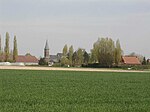The Battle of Bouvines was fought on 27 July 1214 near the town of Bouvines in the County of Flanders. It was the concluding battle of the Anglo-French War of 1213–1214. Although estimates on the number of troops vary considerably among modern historians, at Bouvines, a French army commanded by King Philip Augustus routed a larger Allied army led by Holy Roman Emperor Otto IV in one of the rare pitched battles of the High Middle Ages and one of the most decisive medieval engagements.
In early 1214, a coalition was assembled against King Philip Augustus of France, consisting of Otto IV, King John of England, Count Ferrand of Flanders, Count Renaud of Boulogne, Duke Henry I of Brabant, Count William I of Holland, Duke Theobald I of Lorraine, and Duke Henry III of Limburg. Its objective was to reverse the conquests made by Philip earlier in his reign.
After initial manoeuvring in late July, battle was offered near Bouvines on 27 July. The long allied column deployed slowly into battle order, leaving the Allies at a disadvantage. The superior discipline and training of the French knights allowed them to carry out a series of devastating charges, shattering the Flemish knights on the allied left wing. In the centre, the Allied knights and infantry under Otto enjoyed initial success, scattering the French urban infantry and nearly killing Philip. A counterattack by French knights smashed the isolated Allied infantry and Otto's entire centre division fell back. Otto fled the battle and his knightly followers were defeated by the French knights, who went on to capture the Imperial eagle standard. With the Allied centre and left wing routed, only the soldiers of the right wing under Renaud of Boulogne and William de Longespee held on. They were killed, captured or driven from the field. A pursuit was not conducted as it was nearly dark.
The crushing French victory dashed English and Flemish hopes of regaining their lost territories. Having lost all credibility as emperor following the battle, Otto IV was deposed by Pope Innocent III, leading to Frederick II's accession to the Imperial throne. King John was compelled to hand over Anjou, the ancient patrimony of the Angevin kings of England, to Philip in a peace settlement. This confirmed the collapse of the Angevin Empire. The disaster at Bouvines forever altered the political situation in England, as John was so weakened that his discontented barons forced him to agree to the Magna Carta in 1215. Counts Ferrand, Renaud and Longespee were captured and imprisoned. The balance of power shifted, with the popes of the 13th century increasingly seeking the support of a powerful France. Philip had achieved remarkable success in the expansion of his realm and by the end of his reign, in 1223, had not only laid the foundations for the era of Capetian pre-eminence in Europe which followed and marked much of the Late Middle Ages, but also those of the absolutism that came to define the Ancien Régime.









